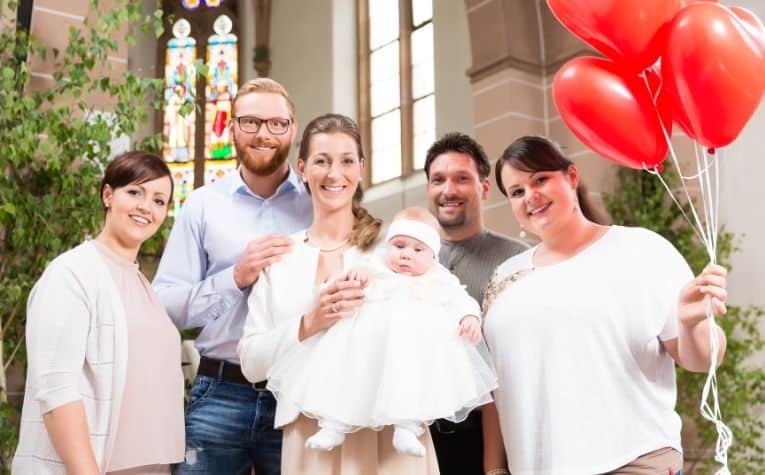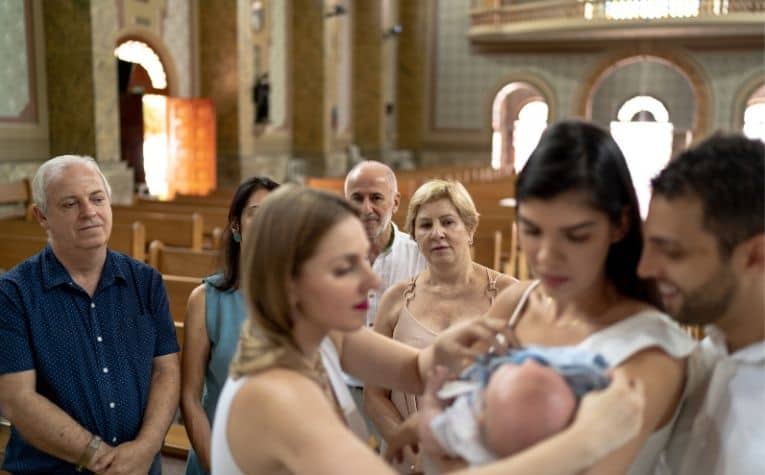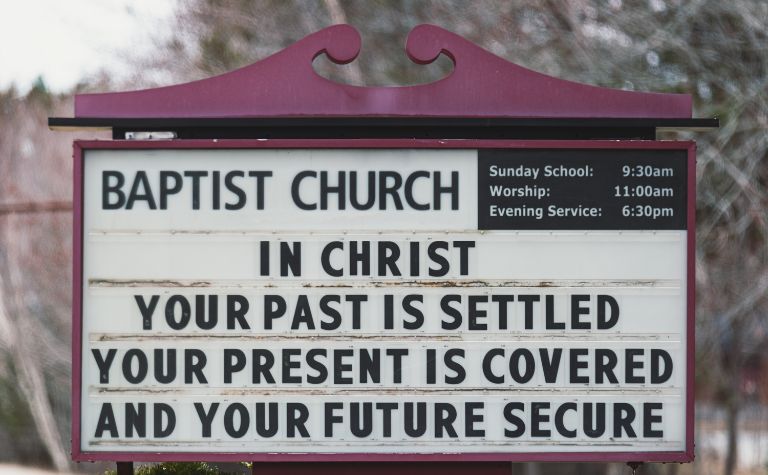Godparents have been part of certain Christian traditions for centuries, playing an important role in churches and families. To some parents, deciding who will be their child’s godparent is as important as what name to give them. But can anyone be a godparent? Can Baptists be godparents?
A Baptist church member would be allowed to be a godparent in some non-Baptist Protestant denominations but not in other traditions like Roman Catholicism. It’s less likely in Lutheran and Reformed traditions, and it’s more likely in Methodist and Anglican traditions.
The Roman Catholic church has certain requirements that a person must meet in order to be a godparent. Protestant denominations that practice the tradition of having godparents for children also have requirements, but they tend to be less formal and concrete. Keep reading to learn more.

Qualification for being a Godparent In a Catholic Church
Historically, Roman Catholicism has had more prerequisites for the role of godparent than any other church. Though some progressive branches of Catholicism exercise more flexibility in such matters, orthodox Catholicism remains committed to its traditional qualifications. (Also, see Baptists vs. Catholics: What’s the Difference?)
Key term | Godparents: “Godparents” comes from an Old English word meaning “kindred.” Traditionally, a child’s birth parents ask a man to be the child’s “godfather” and a woman to be their “godmother.” Together, the pair are “godparents” to their “godchild,” “goddaughter,” or “godson.”
A Baptist would not be permitted to be a godparent of a child whose family is Roman Catholic because they don’t meet all the requirements:
- A godparent must not be the child’s father or mother.
- They must be a confirmed Catholic who has received the Eucharist.
- They must be at least 16 years of age.
- They must be in good standing with the Catholic Church.
Because of these qualifications, many people wonder, “What about a Christian who is in good standing with a non-Catholic church?” According to the Catholic Code of Canon Law, a non-Catholic can only be an informal “witness.” [1]
“A baptized person who belongs to a non-Catholic ecclesial community is not to participate except together with a Catholic sponsor and then only as a witness of the baptism.” (Code of Canon Law, Ch. IV)
A non-Catholic “witness” has no formal role recognized by the Roman Catholic Church. The Catholic church allows for their presence at such events as a child’s baptism and first communion, but not their participation. (Also see This Is Why Baptists Don’t Baptize Infants)

Qualifications for Being a Godparent In Protestant Churches
Whether or not a Baptist could be a godparent in a non-Baptist and non-Roman Catholic church varies.
- Anglican churches: The denomination says that godparents should be baptized and confirmed in the Anglican church, but that stipulation may be waived upon petition. Immediate family members, including birth parents, can be named godparents. While historically, the Anglican church was stricter about the role of godparents, more flexibility exists today, and the clergy has a lot of independence to make decisions on their own. It is possible for a Baptist to be a godparent in an Anglican church.
- Lutheran churches: Lutheran churches that continue to follow the historical teaching of the denomination have prerequisites that must be met in order for a person to be named a godparent. Baptism and confirmation in the Lutheran church are required. Non-Lutherans may serve as witnesses, like in the Catholic church. [2] It is not likely that a Baptist could be a godparent in a traditional Lutheran church. (Also see Baptists vs. Lutherans: What’s the Difference?)
- Methodist churches: John Wesley preached about the value of a child having assigned godparents and encouraged the practice. The Methodist Book of Worship (published in 1992) states that godparents should be confessing believers and part of a Christian church. It is possible for a Baptist to be a godparent in a Methodist church.
- Reformed churches: John Calvin encouraged the practice of naming godparents for newborn children. Calvin himself served in such a role at 47 different baptisms. [3] Traditionally, Reformed parents are instructed to select Reformed godparents for their children. It is not possible for a Baptist to be a godparent in a traditional Reformed church. (Also see Do Baptists Believe in Predestination?)
- Eastern Orthodox: Traditions vary. In some traditions, the role of godparents is ceremonial. In others, godparents are so involved that the godfather gets to name his godson. Parents are instructed to select at least one member of an Orthodox church as a godparent. It is possible for a Baptist to be a godparent in an Orthodox church.
Why Don’t Baptist Churches Have Godparents?
Baptist churches, and the families committed to them, don’t traditionally participate in the practice of naming godparents for their newborn children.
Baptist churches don’t have godparents because their early leaders replaced several older traditions, like the practice of godparents, with newer practices that served the same purpose but gave more control to families and the congregation instead of the clergy.
The spiritual development of children is very important to Baptists, but they use other means to serve this purpose. Since Baptist churches are largely independent congregations, it’s possible that a few participate in this practice, but the majority don’t. (Also, see Baptists vs. Southern Baptists: What’s the Difference?)

Training Children In Baptist and non-Baptist churches
The spiritual development of a child — through the traditional model of godparents or through another approach — is comprised of important moments and ongoing training. For example, baptism is an important moment, while teaching the bible is an ongoing training.
Here is how the godparent tradition approaches these important moments and training and how many Baptist churches do:
- Baptism: Godparents have a role in the child’s baptism, or christening, as a symbol of their role in the child’s spiritual development. Baptist churches don’t practice baptizing infants, as it’s their conviction to baptize confessing believers only. It’s more common to find a “child dedication” in Baptist churches.
Key term | Child dedication: a ceremony performed in many Protestant churches in which the pastor and gathered family and friends surround a newborn baby in the front of the congregation on Sunday morning and pray to “dedicate” the child to God. The pastor also commissions family, friends, and the church to support the child’s spiritual development.
- The Lord’s Supper: Godparents often participate in the child’s first Lord’s Supper, also called communion or the Eucharist. Unlike baptism, children first partake in the Lord’s Supper around age seven. Many Baptist churches invite children to partake in the Lord’s Supper upon responding to the Gospel and confessing Christ as Lord and Savior. (Also see Can a Methodist Take Communion in a Baptist Church?)
Key term | Eucharist: From the Greek word for “thanksgiving,” Eucharist describes a sacrament (in Catholicism) or an ordinance (in Protestantism) where a believer participates in the Lord’s Supper, as Christ instructed them to do prior to his death.
- Education: A godparent’s role in education varies. For some, it may involve teaching or overseeing the child’s learning of catechisms. In other cases, it may include financially supporting their primary and secondary private-school education. Baptist churches rarely use catechisms to train children. Some Baptist families send their children to Christian schools, which are paid for in a variety of ways. (Also see What’s the Difference Between First and Second Baptist?)
- Discipleship: Beyond the one-time events of baptism and the first Lord’s Supper, godparents traditionally have a role in supporting the spiritual development of their godchild. This may include church involvement, praying, bible study, and much more. Baptist churches value discipleship as well. A child’s parents, the church pastor or youth pastor, Sunday school teachers, and others in the congregation often play significant roles in developing a child’s faith.
- Guardianship: Historically, godparents assumed legal guardianship of a child if their birth parents died. Today, this is less common unless the godparents are members of the immediate or extended family to whom the children were already likely to be placed in their custody. (Also see Can Baptists Dance?)
What Are the Responsibilities of Godparents?
In some churches, the role of godparents is mostly ceremonial and the adults assigned to the role have little practical commitment to the child.
In more traditional and liturgical churches, the role of godparents is not merely symbolic but has important, even demanding, responsibilities.
The role of a godparent is to support — and in some cases, lead — the spiritual nourishment and development of the child. This is accomplished in two primary ways:
- Through a direct relationship with the child, teaching and training occurs.
- Providing practical support, such as helping financially for purposes like education.
Baptist churches also care deeply about the spiritual development of children in their congregations. However, how they develop and train them is different from the practice of godparenting. (Also see Can a Baptist Marry a Catholic?)
References:
[1] Source
[2] Source
[3] Source
Related Questions
The Baptist tradition is one of the largest branches of Christianity in America and around the world. Historically, some Protestant denominations have prohibited their members from activities like...
Baptist denominations and churches, which date to the 17th century, comprise one of the largest branches of Christianity in the Western world. While Christian churches in Baptist networks and...
